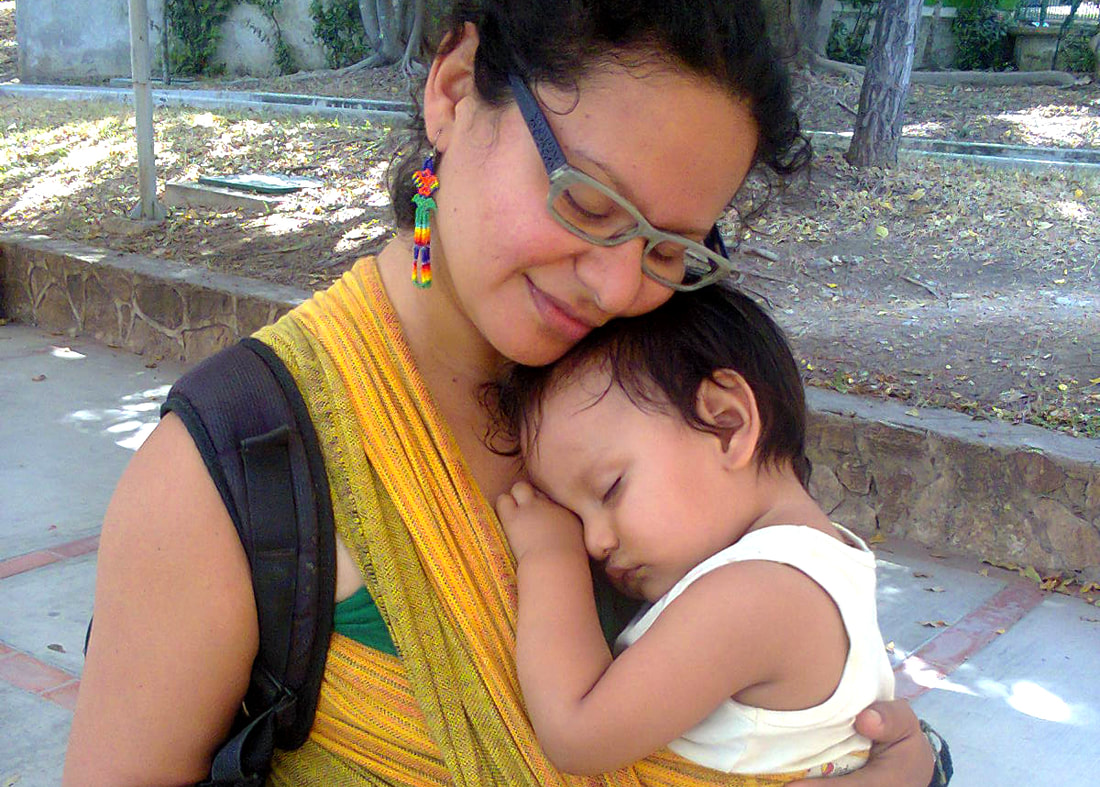|
This year, Human Rights in Childbirth has partnered with Birth India to bring the conference and the conversation to India in February 2017. Birth India is a non-profit, non-governmental organisation registered in 2011 to support families and the community in seeking and selecting skilled, respectful care providers for women during their birthing year. Their mission is to promote evidence based benefits and best practices for childbirth in India by advocating for women’s reproductive rights and spreading awareness on mother-baby-friendly care. We are a comprehensive network that serves to connect pregnant couples with birth professionals, research, educational, and advocacy organisations in order to provide a platform for professionals and families across India to engage with one another in a supportive and truthful manner. HRiC asked members of the Birth India team find out what makes motivates them and what makes them tick! Ruth Malik (aka The Founder of Birth India & mother of two) Why did you start a childbirth network? What’s the dream? I was motived to start Birth India after my second necessarian. I was increasingly aware of the large numbers of women around me who had birthed via caesarean surgery, my entire building, my son’s preschool class, and so on. I felt something was not right! After a chance meeting with an Australian midwife and an evening looking over my hospital files on her living room floor, I came to understand that there was nothing wrong with me. A cord around the neck is not an indication for a caesarean and 40 weeks is not postdates. My world view was shattered, I learned that the professionals can not be trusted. My body was violated for financial gain and convenience. Laws were broken! I was motivated to learn about birth at least for my daughter. I am also someone who had always believed if someone violated me I would do something about it. My experience with the court system in India was inspiring and I know that every woman in India has a strong democracy, awesome advocates and an admirable legal and court system behind her. I also wanted to understand why I had believed that nothing would be done to me in a hospital unless necessary. I now see that we are all, both women and men (my doctors were women) manipulated by authoritarian control, misogyny, fear mongering, and patriarchy, recognizing this and navigation it is a skill that most of us do not possess. I hope that more and more consumers become aware and equipped to navigate this system. I believe that informed women who choose services that respect their human rights will be the change. However, we desperately need to have respectful options available. Connect with her: Facebook, email Divya Deswal – (aka Divya the Doula from Delhi) What motivated you to become President of Birth India and how do you see Birth India as a national organization? For me Birth India was like home from the beginning. In the 5 years I had worked alone, I had begun to realize that what was missing in the birthing room of women, was also missing from their lives. Be it mothers or birth workers, female energy is a field phenomenon – working together, sharing, holding space, listening, in harmony. Our diversity is not a cause of conflict but we complement each other. BirthIndia as an organization is a community that not only holds the big picture of maternity and child welfare but also provides a personal, local individual touch. No matter where I am, I have a sister to call, a confidant to hear me and a whole power house telling me ‘I can’. Being the President is a place of honor, and for this brief tenure I want to say ’ I am here.’ Connect with her: email Shivani Sharma (aka The Engineer-Turned-Passionate Childbirth Educator & happy mom of two) Has Birth India influenced positively for women? How have you seen this in relation to hypno birthing? In a country, which treats medical care providers like demi gods, the concept of reproductive rights is almost non-existent. Birth India has been working earnestly to change this culture and urging parents to question the current birth practices. It has been a slow and steady process but the changes are becoming visible with an increased number of mothers enrolling for HypnoBirthing classes, seeking Midwifery and Doula care, and a rise in ob/gyns being respectful of a mother’s choices. Lina Duncan (aka The Poetic Midwife) Being one of the only professionally trained midwives in Mumbai, how has BirthIndia helped you network and grow? I arrived in Mumbai just in time for the inauguration conference of Birth India. It was exciting to meet a group of people passionate about growing a birth movement to set about to improve all things surrounding reproductive rights and childbirth. I have been grateful for the community of support and definitely found my tribe. Birth India is organically growing and I hope many networks spring up across the nation. My personal dream is that the culture of childbirth will change and women across all spectrums with have the chance to have a female companion for birth, that a midwifery movement will start up and not only will maternal and neonatal mortality reduce, but the quality of care will improve. It doesn’t cost anything to be kind and provide dignified and respectful care. Connect with her: Mumbai Midwife Rita Theobald (aka The Wise Vegan Home Birth Mother) How did you get involved in Birth India and when? I had a home birth in February 2002 with the help of Dai Sitabai. I had the support of few like minded people who had the knowledge and experience of Home Birth. In 2007 while I was travelling to Singapore, I read about the first Birth India conference. I met Ruth & became a member of Birth India to extend support and spread awareness of Natural Child Birth. Connect with her: Facebook Kanika Aswani (aka The Happy Healer and mom) What is your hope for women around India and how can Birth India help? In an ideal world a women would naturally trust her body to give birth in the way she chooses. She would surround herself with loved ones or not (her choice), she could choose to birth in water, on her bed, walking around, squatting or whatever way she thought would be ideal at that moment. She’d make a beautiful quiet and gentle space for herself, low lights, soft music – a space where she can connect with herself and the baby. The baby would come into the world in his mother’s arms and feel secure at his mother’s breast. Having had the privilege to birth this way, I hope for women to realize how powerful our bodies are and how well the body supports a calm, gentle and natural birth if you are truly connected with the process. This means, there is minimal disturbance in the birth environment and the mother feels absolutely relaxed and supported for her hormones to work their best. I hope for women to be empowered and not be led by fear, I hope for women to empower themselves with information before choosing where and whom to birth with. I hope for women to do their research about the procedures at the hospital, during childbirth, the pros and cons of each. A midwifery and doula care model should be introduced in hospitals for women to experience birth at its best, without unnecessary interventions. Lastly, doctors need to treat women with dignity and not like machines coming in to pop out babies. Just because the tools exist, they do not have to be have to be used. The body is the most sophisticated mechanism. Given the right kind of environment and support, it will do it’s best for Mother and Baby. Connect with her: Facebook Tina Nandi Stephens (aka Wife, Mother, Photographer + dabbler in graphic design & Indelible Environmentalist) How did you join the team? What motivates you to create and design attractive graphics and to photograph birth? My impressions of birth was always negative – a painful, horrible experience that women just have to go through in order to have a baby. This started to change when I happened upon beautiful images of births captured by photographers. I was confused by the beauty and the power in the faces of the women in these images. Could birth actually be an empowering experience? From here began my education in birth. I read voraciously and became passionately determined to share my new found knowledge of gentle and empowering births through birth photography. I also found an incredible ‘tribe’ of women through Birth India who are also lending their time and their skills to spread the awareness. I birthed my own son surrounded by the love and knowledge of these women and I know that because of that, I was never afraid and even now, I am never alone through the challenges of motherhood. Every woman deserves and needs to be connected to a ‘tribe’ like the one I have found in Birth India! Connect with her: photography, email, Facebook Aloka Mehta Gambhir (aka Lactation councilor & baby wearing mother of two) What have you heard and seen that disturbs you surrounding childbirth and how do you think Birth India can be a solution? After birthing my first baby in a very ‘routine’ way as per what the ‘system’ finds normal aka medicines to speed up labour, impersonal wisecracks in the delivery room, episiotomies without consent, anything and everything without consent; I realised once I started speaking out, most mothers had the same experience and the shocking part was that everyone found it acceptable and normal. Women who are so outspoken in every other area are so timid, obedient, and ready to comply during childbirth and this disturbs me. To me Birth India is a great tool to spread awareness that there is another way and it’s an amazing platform to connect likeminded mothers and professionals. Connect with her: Blog Mansi Shah (aka The Quiet Organiser) As a young mother of two what do you think is Birth India’s most important message to get “out there”? As a young mother of two I would like Birth India to promote the childbirth education to include education that would include not only how to breastfeed, labor, baby care, but also post partum depression. Birthing is not only the enough to a healthy life but the mental health of a mother is important. I’d love Birth India to address what a new mother faces internally with regards to postpartum hormones in the near future. So that’s Birth Inda for you, and we’re all looking forward to an enriching conference in Feburary 2017. Incase you haven’t registered already, sign up soon to avail of the early bird discounts! Don’t forget to register to attend the Human Rights in Childbirth Conference in Mumbai, India.
Sign this petition to make it mandatory that Indian hospitals declare their c-section rates! Check out Human Rights in Childbirth on Facebook. Ask questions, find support and information at Birth India’s Facebook Support Group.
0 Comments
Leave a Reply. |
Archives
May 2021
Categories
All
|
|
HRiC is not a law firm or healthcare provider and does not give legal or healthcare advice. Nothing on this website should be taken as advice about your personal situation, your healthcare or the current state of the law in your state or nation. If you need legal or healthcare advice or information, seek out a suitably qualified professional licensed to practice in the state or nation where you live.
Human Rights in Childbirth is an IRS-approved 501(c)3 charity. Tax ID 47-4432099 |
© HumanRightsInChildbirth. All rights reserved.


